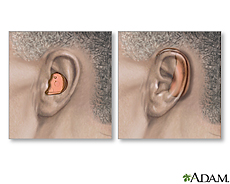
| New on the MedlinePlus Hearing Aids page: 04/13/2016 02:39 PM EDT Source: National Library of Medicine -   deafness and myopia syndromeDeafness and myopia syndrome is a disorder that causes problems with both hearing and vision. People with this disorder have moderate to profound hearing loss in both ears that may worsen over time. The hearing loss may be described as sensorineural, meaning that it is related to changes in the inner ear, or it may be caused by auditory neuropathy, which is a problem with the transmission of sound (auditory) signals from the inner ear to the brain. The hearing loss is either present at birth (congenital) or begins in infancy, before the child learns to speak (prelingual). Affected individuals also have severe nearsightedness (high myopia). These individuals are able to see nearby objects clearly, but objects that are farther away appear blurry. The myopia is usually diagnosed by early childhood.   MEDICAL ENCYCLOPEDIANational Institutes of HealthA hearing aid is a small electronic device that you wear in or behind your ear. It makes some sounds louder. A hearing aid can help people hear more in both quiet and noisy situations. Hearing aids help people who have hearing loss from damage to the small sensory cells in the inner ear. The damage can occur as a result of disease, aging, or injury from noise or certain medicines. Only about one out of five people who would benefit from a hearing aid actually uses one. If you think a hearing aid could help you, visit your doctor. There are different kinds of hearing aids. They differ by size, their placement on or inside the ear, and how much they amplify sound. The hearing aid that will work best for you depends on what kind of hearing loss you have, and how severe it is. NIH: National Institute on Deafness and Other Communication Disorders
|
































No hay comentarios:
Publicar un comentario